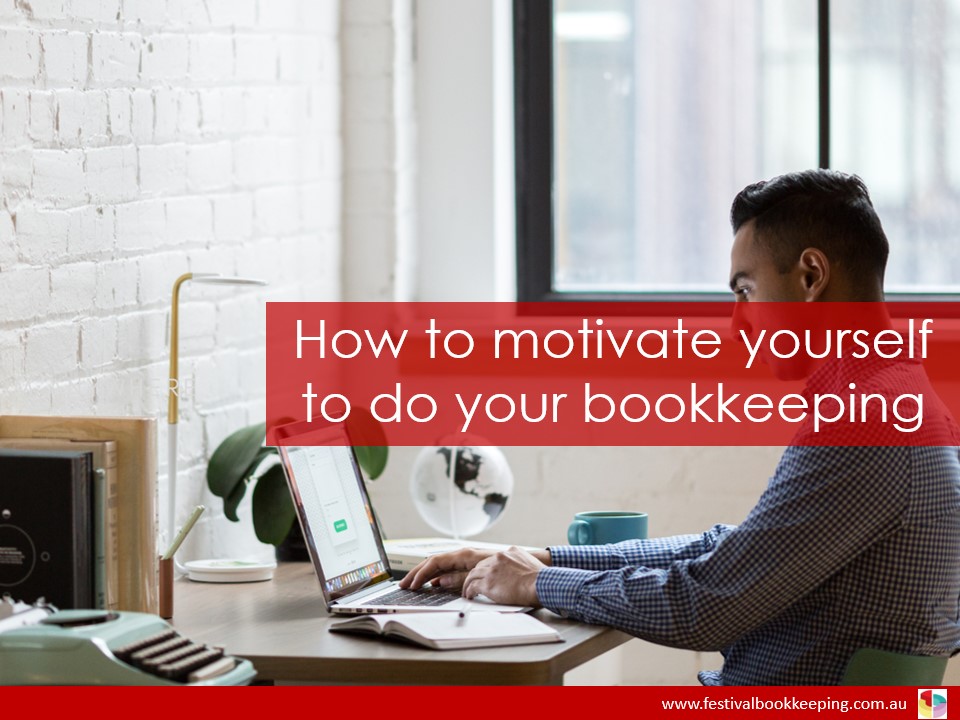
You lean over and turn off your computer after a full day of work. You feel relieved that another day is done. Your mind turns to what you’re going to have for tea and whether you’re going to need anything from the supermarket. Then out of the corner of your eye you spot a couple of receipts partly folded and starting to fade that are placed precariously on top of a pile of other papers. Sigh….you still haven’t done your bookkeeping. Another day has gone and you didn’t get around to it like you promised yourself you would. Again.
If you don’t run your own small business, this scenario might seem a little trivial. It’s just entering a few dates, names and numbers, right?
Well I’ve lost track of the number of small business owners that have confided in me how bad they feel about being behind in their bookkeeping and how much it’s affecting their personal life and business life.
This is what I hear a lot:
“My partner is getting frustrated with me because I don’t know my figures”
“My tax return is overdue and I’m sure I’m going to get a big fine that I can’t afford”
“I’m sure I will need to register for GST soon, but I don’t know what my income is. It’s really worrying me because I know I have to do something about it soon”
“My business coach keeps asking for my figures – but I don’t know them”
Now you would think I’m going to tell you that you should outsource to a bookkeeper or buy this new, beaut software. But that’s not what this post is about. This post is to genuinely share methods that small business owners can use themselves, in order to gain the motivation to get their bookkeeping done. These methods are what I use myself when motivation is low, or overwhelm is high. They are not expensive or difficult and I’m sure that if you use even a couple of these methods, you will get your bookkeeping done or at the very least make great progress.
1. Use a timer
This can be an online timer, your watch, or even try an old-school method. Set the timer for a short period of time – 40 minutes is fine. Commit to 40 minutes of bookkeeping only. Smash it out and feel great about the progress you just made. Maybe that’s enough – you’ve achieved what you set out to do. Turn off your computer and forget about it for today. Now maybe the time went quickly for you and you feel you’ve got another 40 minutes in you. You’re on a roll. Go off and step out into the sunshine for 5 minutes or make a cup of coffee to reward yourself. Go back to your computer, set the timer for another 40 minutes and smash out another 40 minutes of bookkeeping.
2. Work somewhere different
If you’ve got a laptop, move it out of the office to the dining room table. Or move it from the dining room table to the bedroom. Personally I would have difficulty working outside, but if that works for you, then go for it. Go to the library (I get phenominal amounts of work done when I work from the library – however it’s usually business development work and not accounting, as I don’t want to risk others accessing my accounting information because I’m using a public internet connection). Go to your parent’s house. Book a once-off day to work from a co-working space. Just change up where you’re working from, because sometimes just the thought of sitting down at that same spot that you’ve already spent hours at can be depressing.
3. Treat yourself

Buy snacks for yourself that you wouldn’t normally buy – specifically for bookkeeping. Treat yourself with something nice, so that sitting down to do your bookkeeping is a positive experience.
4. Do smaller amounts often
Now you might not realise that this is one of the reasons you put off your bookkeeping. But if you’re only logging into your software or opening up your spreadsheet every few months (or even longer), then you’re probably forgetting how to do a lot of it. Decision fatigue is a thing! If you have to keep stopping and deciding what to do next, or are trying to remember how you did something last time, then you’re wearing yourself out without even realising it. By doing it more regularly, everything will stay fresh in your mind.
5. Eat the ugliest frog first
This has been one of my most helpful business mantras since I discovered it about 5 years ago. If I’ve lost you here, check out Brian Tracy. I’m thinking bookkeeping might be your Ugliest Frog. So eat it first!! Practise a bit of tough love on yourself and do your bookkeeping before you do anything else that day. You can even try getting up 40 minutes earlier, for the sole purpose of getting bookkeeping done. The rest of the day will feel SO good for you that the decision to then get up and do the same thing the next day will be even easier. Your day will flow a lot better and you’ll become much more productive in general. You can use this concept for anything in your personal or business life.
6. Listen to music

This seems a bit obvious, but how often do you actually make the effort to put on music while you work at your computer? Or if you are doing your bookkeeping first thing in the morning, have music on while you’re in the shower before you start. Similar to the special snacks you treat yourself with, you will start to look forward to doing your bookkeeping because you’ve made a fun ritual for yourself.
7. Start tracking your monthly income
This doesn’t need to be fancy. Start writing down your total sales each month. Each time you get another month’s bookkeeping done, record somewhere separately what that monthly sales were. Some months it may be less than the month before – that’s okay. You just motivated yourself to kick butt that bit more in the next 4 weeks. Some months it will be more than the month before – congratulations! Something you’re doing is working – the proof is in the numbers. It’s quite addictive once you start tracking your numbers – you will find yourself automatically motivated to get your bookkeeping done.
8. Just turn on the computer
In my early 30’s I used to run a lot. There’s a trick with runners to keep motivation up – they say just to “put on your sneakers”. It really works. Once those runners are on, it’s that much more easier to just step out the door and do your run. Do this trick with your computer. Get up and turn it on! Before you get dressed. Before you make your coffee. Before you check your phone. When I have a particularly overwhelming and large client job to do, this (oh so easy) tip works every time.
9. Positive mindset
I know it’s easy to get into the mindset that bookkeeping is boring. Bookkeeping is pointless. Bookkeeping is hard. Or thinking “numbers aren’t my thing”. Well I challenge that mindset. You’re not going to love everything in business – if it was easy, then everyone would be doing it and doing it successfully, right? Having a positive mindset helps in all areas of your business and personal life. You can choose to keep thinking bookkeeping is horrible – and continue to avoid doing it – and continue to beat yourself up over not doing it. Or you can choose to re-frame your thinking around it.
For example:
I can’t wait to get that 40 minutes of bookkeeping done, because then I’ll be on track to get my tax return done early this year. Gee that’s going to feel good.
I feel like my sales are up this month – I can’t wait to check my income spreadsheet to see if I hit $5,000 in sales finally.
Woo hoo – another month’s bookkeeping done. Time to hit the pub.
Okay – so these might seem a bit corny, but you see what I mean. Your bookkeeping is what you tell yourself it is. You get to choose your attitude.
Why would a bookkeeper share these tips?
I don’t mind sharing these tips with small business owners. There will always be business owners that don’t want to outsource their bookkeeping. There will always a point in time when it makes sense for a small business owner to do their own bookkeeping. When it’s time to outsource – it’s time to outsource. The cons of doing it yourself will outweigh the pros and you will (probably with relief I’m thinking) hand it over to a professional bookkeeper.
In the meantime, I just know there’s a tip or 2 above that you can implement straight away. My wish for you is that you no longer feel bad about being behind in your bookkeeping and get to experience that feeling of relief that comes with being up to date very soon!
Happy bookkeeping….
Sarina

About the author.
Sarina Abbott is the owner of Festival Bookkeeping. She’s a registered BAS Agent and Xero adviser who has previously worked in the legal and conveyancing industry, as well as for registered training organisations. She lives in Adelaide, South Australia with her husband, 2 sons, a dog and a rabbit.
You can find out more about Festival Bookkeeping here.
You might also like:








